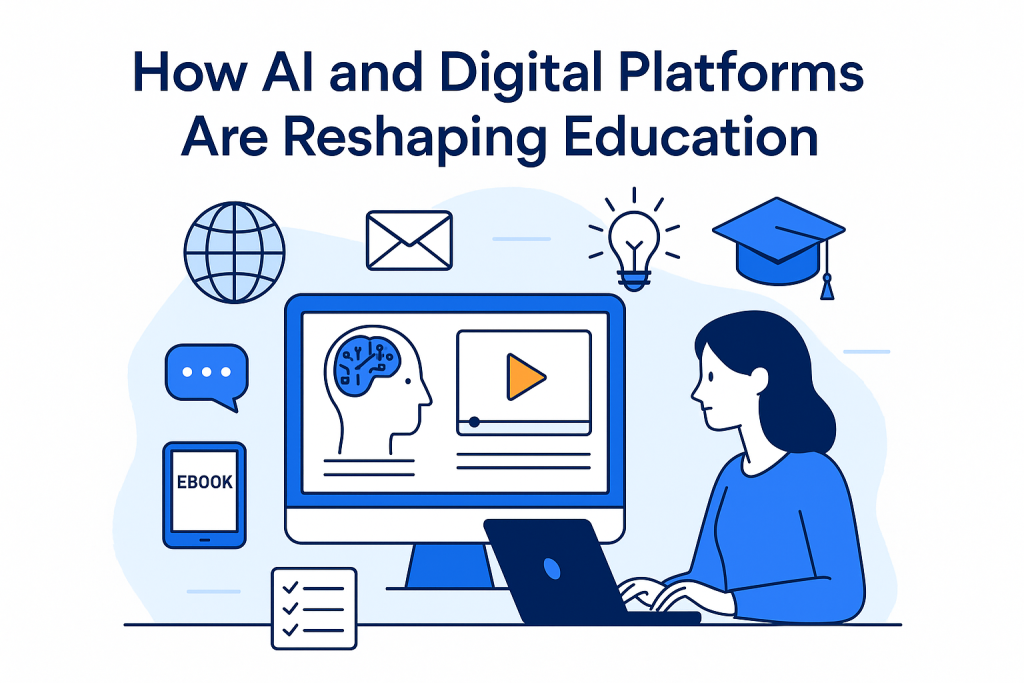 Education has always adapted to new technologies — from chalkboards to online classrooms. Today, Artificial Intelligence (AI) and digital platforms are driving the biggest transformation in learning history. These tools are reshaping how students access knowledge, how teachers deliver lessons, and how institutions operate in a globalized, digital-first world.
Education has always adapted to new technologies — from chalkboards to online classrooms. Today, Artificial Intelligence (AI) and digital platforms are driving the biggest transformation in learning history. These tools are reshaping how students access knowledge, how teachers deliver lessons, and how institutions operate in a globalized, digital-first world.
In this article, we’ll explore the key ways AI and digital platforms are changing education in 2025, why this matters for students, and what it means for the future of learning.
1. Personalized Learning with AI
AI enables adaptive learning systems that adjust content to each student’s pace and style. Instead of a “one-size-fits-all” approach:
Students struggling with a concept receive more practice and examples.
Advanced learners can move faster through material.
Teachers get data-driven insights about individual progress.
Example: AI-powered platforms like Coursera and Khan Academy are already integrating adaptive quizzes and personalized study paths.
2. The Rise of Digital Textbooks and eBooks
Traditional printed textbooks are expensive, bulky, and often outdated. AI and digital platforms make it possible to provide:
Affordable eBooks that update in real time.
Searchable content for faster research.
Integration with online tools (highlighting, note-sharing, AI tutoring).
Students can now buy affordable PDF eBooks instantly through platforms like CSTBooks.com instead of spending hundreds on printed editions.
3. Smart Classrooms and Virtual Assistants
AI-driven chatbots and virtual assistants are becoming a common part of education. They can:
Answer student FAQs instantly.
Provide 24/7 tutoring for math, statistics, nursing, or other subjects.
Support teachers by automating grading and attendance tracking.
This allows teachers to focus more on mentoring and creativity, while AI handles repetitive tasks.
4. Global Access to Education
Digital platforms are breaking down geographical barriers:
A student in Vietnam can access the same lectures as someone in the U.S.
Universities can expand their reach globally with online programs.
Open Educational Resources (OER) and free digital libraries make learning accessible for anyone with an internet connection.
Education is no longer limited by physical classrooms.
5. Collaboration Through Digital Platforms
Group projects are now powered by digital tools such as:
Google Workspace (Docs, Slides, Sheets) for teamwork.
Learning Management Systems (LMS) like Canvas and Moodle.
AI tools that help organize research, summarize articles, and even brainstorm.
Students build real-world digital collaboration skills, which are crucial for their future careers.
6. AI in Assessment and Feedback
Grading is one of the most time-consuming tasks for educators. AI systems can:
Automatically grade multiple-choice and short-answer questions.
Provide instant feedback on writing (grammar, clarity, plagiarism detection).
Identify patterns of misunderstanding across entire classes.
This not only saves time but also ensures students receive timely feedback to improve.
7. Addressing Challenges: Equity and Ethics
While AI and digital platforms bring opportunities, they also raise concerns:
Equity: Students without devices or reliable internet may be left behind.
Data privacy: Sensitive student information must be protected.
AI bias: Algorithms may unintentionally reinforce stereotypes or inequalities.
It’s essential for policymakers and institutions to ensure fair and ethical use of these technologies.
8. The Future of Education: Hybrid and Lifelong Learning
The future of education is blended — combining physical classrooms with AI-powered digital platforms. Students will:
Learn flexibly across devices and locations.
Engage in lifelong learning, upskilling continuously through online platforms.
Benefit from affordable resources like eBooks, micro-courses, and AI tutors.
Education in 2025 and beyond will be more personalized, accessible, and lifelong than ever before.
Conclusion
AI and digital platforms are not just tools; they are reshaping the entire foundation of education. From personalized learning and affordable eBooks to global access and AI-driven classrooms, the shift is already here.
For students, this means cheaper resources, more flexible learning, and better outcomes. For educators, it’s an opportunity to focus on mentorship and creativity while technology handles repetitive tasks.
Ready to embrace the future of education? Start with affordable, accessible eBooks at CSTBooks.com and join the digital learning revolution today.
